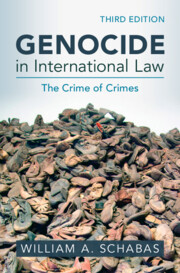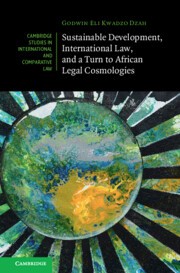Refine search
Actions for selected content:
94 results
The indictments against Adolf Hitler, their endorsement by the UNWCC, the IMT judgment and a twenty-first century immunity myth
-
- Journal:
- Leiden Journal of International Law , First View
- Published online by Cambridge University Press:
- 06 October 2025, pp. 1-24
-
- Article
-
- You have access
- Open access
- HTML
- Export citation
Rethinking Law through Vernacular Records: Archive Encounters and the Recovery of Native Court Records in Uganda
- Part of
-
- Journal:
- Transactions of the Royal Historical Society / Volume 3 / December 2025
- Published online by Cambridge University Press:
- 29 July 2025, pp. 377-390
- Print publication:
- December 2025
-
- Article
-
- You have access
- Open access
- HTML
- Export citation
Judicial Marginalization of Communal Land Tenure in South Africa: A Critique of CASAC v Ingonyama Trust
-
- Journal:
- Journal of African Law / Volume 69 / Issue 2 / June 2025
- Published online by Cambridge University Press:
- 22 May 2025, pp. 323-332
- Print publication:
- June 2025
-
- Article
-
- You have access
- Open access
- HTML
- Export citation
Part I - Foundations of International Human Rights Law
-
- Book:
- International Human Rights Law
- Published online:
- 10 April 2025
- Print publication:
- 01 May 2025, pp 1-154
-
- Chapter
- Export citation
3 - The Status and Jurisdiction of the Prohibitions under International Law
-
- Book:
- The Prohibition of Torture and Ill-Treatment under International Law
- Published online:
- 17 April 2025
- Print publication:
- 24 April 2025, pp 75-96
-
- Chapter
- Export citation
17 - Tribal Legal Institutions
- from Part III - Becoming Nations Again
-
- Book:
- Becoming Nations Again
- Published online:
- 17 April 2025
- Print publication:
- 24 April 2025, pp 266-281
-
- Chapter
-
- You have access
- Open access
- HTML
- Export citation
Introduction
-
- Book:
- Genocide in International Law
- Published online:
- 14 March 2025
- Print publication:
- 03 April 2025, pp 1-13
-
- Chapter
-
- You have access
- HTML
- Export citation

Genocide in International Law
- The Crime of Crimes
-
- Published online:
- 14 March 2025
- Print publication:
- 03 April 2025
3 - The Exclusive Economic Zone in the United Nations Convention on the Law of the Sea
- from Part I - The Development and Status of the Exclusive Economic Zone
-
- Book:
- Finding a Balance in the Exclusive Economic Zone
- Published online:
- 17 January 2025
- Print publication:
- 23 January 2025, pp 37-74
-
- Chapter
-
- You have access
- Open access
- HTML
- Export citation
13 - Western Education
- from Part III - Colonial Societies
-
- Book:
- Understanding Colonial Nigeria
- Published online:
- 21 November 2024
- Print publication:
- 28 November 2024, pp 276-302
-
- Chapter
- Export citation
The Pursuit of an Appropriate Dispute Resolution Philosophy for Africa
-
- Journal:
- Journal of African Law / Volume 69 / Issue 1 / February 2025
- Published online by Cambridge University Press:
- 21 November 2024, pp. 1-19
- Print publication:
- February 2025
-
- Article
-
- You have access
- Open access
- HTML
- Export citation
Chapter 42 - Battle of the Qāḍīs
- from Part VI - Alternative Sources for Islamic Legal Studies
-
-
- Book:
- Islamic Law in Context
- Published online:
- 14 November 2024
- Print publication:
- 21 November 2024, pp 434-448
-
- Chapter
- Export citation
State of Reciprocity: The “Looping Effect” in the Circular Production of Colonial Knowledge, Social Customs, and Tax Policy in Nineteenth- and Twentieth-Century Indonesia
-
- Journal:
- Itinerario / Volume 48 / Issue 2 / August 2024
- Published online by Cambridge University Press:
- 21 October 2024, pp. 169-184
-
- Article
-
- You have access
- Open access
- HTML
- Export citation
5 - Sustainable Development and the Turn to African Legal Ontologies
- from Part III - Thinking Alternatives
-
- Book:
- Sustainable Development, International Law, and a Turn to African Legal Cosmologies
- Published online:
- 16 May 2024
- Print publication:
- 23 May 2024, pp 201-244
-
- Chapter
- Export citation

Sustainable Development, International Law, and a Turn to African Legal Cosmologies
-
- Published online:
- 16 May 2024
- Print publication:
- 23 May 2024
Custom Versus Customary Law: Does South African Jurisprudence Draw the Distinction?
-
- Journal:
- Journal of African Law / Volume 68 / Issue 3 / October 2024
- Published online by Cambridge University Press:
- 29 April 2024, pp. 323-339
- Print publication:
- October 2024
-
- Article
-
- You have access
- Open access
- HTML
- Export citation
2 - The Legal and Philosophical Dichotomy between Land and Property
- from Part I - The Rights and Wrongs of South African Property Law
-
-
- Book:
- Beyond Expropriation Without Compensation
- Published online:
- 28 March 2024
- Print publication:
- 04 April 2024, pp 55-70
-
- Chapter
-
- You have access
- Open access
- HTML
- Export citation
7 - Land Reform Opportunities Meet Democratic Challenges in Traditional Areas
- from Part II - Potentials and Pitfalls of South African Land Reform
-
-
- Book:
- Beyond Expropriation Without Compensation
- Published online:
- 28 March 2024
- Print publication:
- 04 April 2024, pp 165-189
-
- Chapter
-
- You have access
- Open access
- HTML
- Export citation
11 - Clashing Identities?
- from Part II - Comparative Perspectives
-
-
- Book:
- Deciphering the Genome of Constitutionalism
- Published online:
- 14 March 2024
- Print publication:
- 21 March 2024, pp 138-149
-
- Chapter
- Export citation
27 - Legal Pluralism and Commerce
- from Part III - Central Themes in Comparative Law
-
-
- Book:
- The Cambridge Handbook of Comparative Law
- Published online:
- 26 January 2024
- Print publication:
- 01 February 2024, pp 544-558
-
- Chapter
- Export citation
